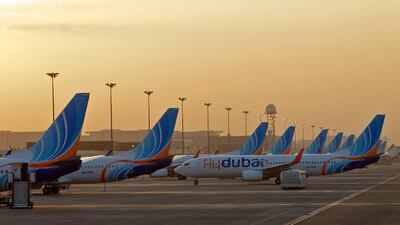Budget airline Flydubai — the second-biggest customer of the grounded Boeing 737 Max — swung to an annual profit in 2019, helped by compensation from the plane maker and a drop in operating costs.
The company posted a profit of Dh198.2 million last year, Flydubai said on Wednesday, from a net loss of Dh159.8m in 2018. Annual revenue dipped to Dh6 billion in 2019, from Dh6.2bn a year earlier.
The interim settlement agreement with Boeing "has contributed towards this year’s results, but in no way can it compensate for the loss of business opportunity or market share experienced by the airline", Ghaith Al Ghaith, Flydubai's chief executive, said. “Discussions are continuing between the parties regarding the ongoing impact of the grounding.”
Flydubai, the UAE's sole 737 Max operator, had ordered 250 of the narrowbody jets for its expansion plans and took delivery of 14 Maxs. A global grounding of the jet ensued last March after the model was involved in two crashes within a span of five months that killed 346 people.
"It is regrettable that our growth strategy has been significantly impacted by the grounding of the Boeing 737 Max," Mr Ghaith said. “Whilst 2019 has seen a return to profitability it does not reflect the loss of market position and the unfilled opportunities Flydubai could have exploited.”
State-owned Flydubai, the sister airline of long-haul operator Emirates, said the terms of the compensation agreement with Boeing are confidential but that discussions are continuing about the ongoing impact of the grounding. The Chicago-based plane maker has already had to compensate several airline customers with grounded jets. Boeing estimates its troubled Max will resume commercial flights by the middle of 2020, though it has missed previous targets.
Flydubai carried 9.6 million passengers last year, fewer than the 11 million travellers in 2018, as its fleet size shrank by more than a quarter to 45 jets as of December 31 2019 following the Max grounding. Capacity dropped 15.8 per cent year-on-year and the grounding led to the cancellation of 19 per cent of its flights.
Operating costs dropped 17.8 per cent, while yields showed double-digit growth, Flydubai said.
"We have kept a firm grip on the business against the continued uncertainty created by the grounding. We have had to be even more flexible with the abrupt interruption of our growth and fleet," Francois Oberholzer, chief financial officer at Flydubai, said.
Fuel costs made up 25.8 per cent of total annual operating costs as the average price of jet fuel dropped by 9 per cent. The airline did not benefit from the efficiency gains expected from the more fuel-efficient 737 Max model because of the continued grounding, it said.
“The preparation for this year’s outlook statement is challenging given the uncertainty around the timetable for the return to service of the Boeing 737 Max aircraft and the subsequent aircraft delivery schedule," Mr Ghaith said.
Its current fleet size is hindering its ability to open new routes and add frequencies, he said.
The discount carrier is exploring options to extend the term for the lease of aircraft that were due to leave its fleet in 2021.


